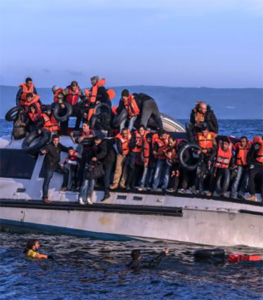EU accused of paying to keep asylum seekers away
The European Union (EU) has been paying other countries to keep migrants away from its shores effectively using aid money as an instrument of migration policy, according to two new reports.
The reports, released separately by the New York Times and the charity Oxfam accuse the EU of effectively introducing an offshore processing system.
 A report in the New York Times claims the EU paid Turkey billions to keep refugees from crossing into Greece.
A report in the New York Times claims the EU paid Turkey billions to keep refugees from crossing into Greece.
It also claims the EU has funded the Libyan Coast Guard to catch and return migrant boats to North Africa.
And, that the EU set up centres in Niger to process asylum seekers if they made it that far.
The report includes criticism from humanitarian and refugee-rights groups about the deplorable conditions in some detention centres also of the fact the few consigned to them have any real chance of gaining asylum.
Tens of thousands of migrants and asylum-seeking remain trapped in Libya’s militias control detention centres. The New York Times report claimed that migrants are sold as slaves or into prostitution, and kept in places so packed that there is not even enough floor space to sleep on.
Meanwhile, the international NGO Oxfam said EU development funds for Africa were often tied to the ability for countries to curb migration to Europe.
Between November 2015 and May 2019, nearly €4 billion ($US4.4 billion) was spent largely without public oversight, according to Oxfam.
The allocation of the funds was often based on political considerations rather than effectiveness and need.
The EU Emergency Trust Fund for Africa was highlighted in the Oxfam report as often being used a migration policy instrument.
Some of the fund’s largest recipients were countries with known patterns of abusive behaviour towards migrants, such as Libya, the report said.
Report author Raphael Shilhav said the lack of transparency in the allocation of funds — often a prerequisite for its release — posed major problems.
“There’s no one tracking the money beginning to end,” Mr Shilhav said.
The report said Libya had come under increased scrutiny over the past two years following reports of mass detention centres where authorities abused migrants and, at times, forced them into hard, unpaid labour or slavery.
Under the ‘Sophia’ naval mission, the EU has provided support to the Libyan coast guard to stem the flow of migrants across the Mediterranean to Italy, the report said.












